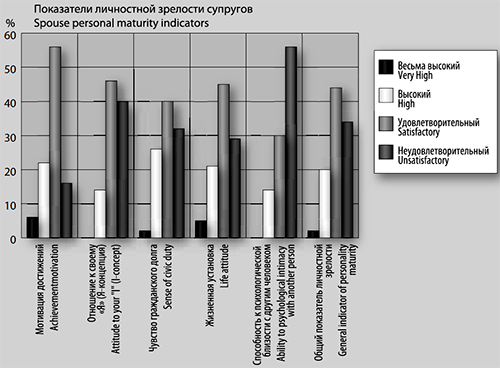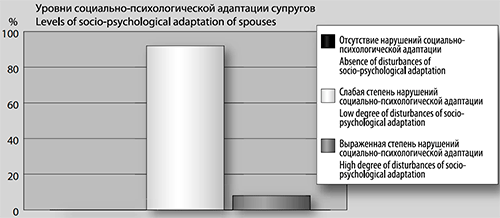Article
Rean A.A., Evgrafova Yu.A. (2019). The study of personal maturity and socio-psychological adaptation of the spouses in young couples. National Psychological Journal, [Natsional’nyy psikhologicheskiy zhurnal], (12)3, 80–87
Abstract
Background. The change of the traditional model of family relations that has occurred in recent decades in modern society, the change in marriage and family attitudes and values, gender roles and stereotypes lead to difficulties in the process of socio-psychological adaptation of young people who get married. Simultaneously, the effectiveness of adaptation depends on various aspects, e.g. personal maturity of spouses that determines not only the effectiveness of adaptation to family life, but also the stability of family relations. This identifies the need to study the relationship of personal maturity of young spouses and their socio-psychological adaptation to family life.
The Objective purpose is to study the dependence of personal maturity and socio-psychological adaptation of the spouses in young couples.
Design. The study involved 150 young couples. The age of spouses is 20-30 y.o. Taking residence together is up to five years. The study used the following methods: test questionnaire of Yu.Z. Gilbuha, questionnaire of D.L. Burtyansky and V.V. Crishtal.
Results. The results showed the existence of a connection between such indicators of personal maturity as the achievement motivation, life attitude, the ability for psychological intimacy with another person and socio-psychological adaptation. Also, the dependence has been established between the general indicator of personal maturity and socio-psychological adaptation. The hypothesis about the relationship between indicators of personal maturity and socio-psychological adaptation of spouses in young married couples has been partially confirmed.
Conclusion. The development of the orientation of spouses to self-realization in family life, high emotional stability, empathy can increase the level of spouse adaptation to family life.
Accepted: 09/12/2019
Pages: 80-87
DOI: 10.11621/npj.2019.0309
PDF: Download
Keywords: personal maturity; indicators of personal maturity; socio-psychological adaptation; family adaptation; young married couples;
Available Online 20.10.2019

Fig. 1. Indicators of spouse personal maturity in young married couples (per cent)

Fig. 2. Disturbances of the socio-psychological adaptation of spouses in young couples (per cent)
References:
Aleshina Yu.Ye. (2005) Individual and family psychological counseling. M.: Klass.
Antonovsky A., & Sourani T. (1988) Family Sense of Coherence and Family Adaptation. Journal of Marriage and Family, 50(1), 79–92. doi: 10.2307/352429
Arnett J. (2015) Emerging Adulthood: The Winding Road from the Late Teens through the Twenties. Oxford: Oxford University Press. doi: 10.1093/acprof:oso/9780199929382.001.0001
Ball G.A. (1989) The concept of adaptation and its importance for the psychology of personality. [Voprosy psikhologii], 1, 92–101.
Bozhovich L.I. (1997) Problems of personality development. Moscow, Institut Practicheskoy Psikhologii. Voronezh, NPO Modek.
Bradbury T., Fincham F., & Beach S. (2000). Research on the nature and determinants of marital satisfaction: A decade in review. Journal of Marriage and Family, 62, 964–980. doi: 10.1111/j.1741-3737.2000.00964.x
Bumpuss L.L., Martin T.C., & Sweet J.A. (1991). The impact of family background and early marital factors on marital disruption. Journal of Family Issues, 22–42. doi: 10.1177/019251391012001003
Conger R.D., Conger K.J., & Martin M.J. (2010). Socioeconomic status, family processes, and individual development. Journal of Marriage and the Family, 72, 685–704. doi: 10.1111/j.1741-3737.2010.00725.x
Das J. (2014). Emotional Maturity among Love Marriage Couples – With Special References to Agartala. International Journal of Humanities and Social Science Invention, 1–4.
Elder J., & Glen H. (2003) The Emergence and Development of Life Course Theory. Handbook of the Life Course. New York: Springer, 3–19. doi: 10.1007/978-0-306-48247-2_1
Erikson E.H. (1982) The life cycle completed. New York: Norton.
Frankl V. (1990). Man in Search of Meaning. Moscow, Progress.
Fromm E. (1990). Escape from Freedom. In P.S. Gurevich (Ed.). Moscow, Progress.
Gilbukh Yu.Z. (1994). Test questionnaire of personal maturity. Kiev, SPC Psychodiagnostics and Differential Learning.
Golod S.I. (1998). Family and marriage: historical and sociological analysis. SPb., TC Petropolis LLP.
Gozman L.Ya., & AleshinaYu.Ye. (1987). Communication and development of relationships in a married couple. In G.M. Andreeva, YA. Yanoushek (Eds.). Communication and optimization of joint activities. Moscow, Izdatel’stvo Moskovskogo Gosudarstvennogo Universiteta, 140–152.
Grebennikov I.V. (1991). Basics of family life. Moscow, Prosveschenie.
Jaisri M., & Joseph M.I. (2013). Marital Adjustment and Emotional Maturity among Dual-Career Couples. Guru Journal of Behavioral and Social Sciences, 77–84.
Karabanova O.A. (2007). Psychology of family relationships. Moscow, Gardariki.
Kharchev A.G., & Matskovskiy M.S. (1978) Modern family and its problems: a socio-demographic study. M.: Statistics.
Kletsina I.S. (2011). Gender approach in psychological studies of modern family relations. [Vestnik Leningradskogo gosudarstvennogo universiteta imeni A.S. Pushkina]. Psychoogy Series, 5(4), 107–119.
Kletsina I.S., & Prokhorova O.L. (2010). Gender competence: psychological content and specificity of manifestation in interpersonal relations [Vestnik Leningradskogo gosudarstvennogo universiteta imeni A.S. Pushkina]. Psychoogy Series, 5(2), 38–50.
Klever Ph. (2009). Good directed and effectiveness, emotional maturity and nuclear family functioning. Journal of marriage and family therapy, 35, 308–324. doi: 10.1111/j.1752-0606.2009.00120.x
Kon I.S. (1999). Personality and Development. Sociological Psychology. Moscow, Institut prakticheskoy psikhologii; Voronezh: NpoModek.
Lewis R.A., & Spanier G.B. (1982). Marital quality, marital stability and social exchange. Family relationships: Rewards and costs. A Sage Focus Edition, 49–65.
Maslow A.H. (1993). The farther reaches of human nature. New York: Arkana.
McCrae R.R., Costa P.T. (2005). Personality in Adulthood. New York: Guilford Publications.
Mosavi S.E., & Iravani M.R. (2012). A study on relationship between emotional maturity and marital satisfaction. Management Science Letters, 2, 927–932. doi: 10.5267/j.msl.2011.10.012
Noller P., & Feeney J.A. & Peterson C.L. (2001). Personal Relationships Across the Lifespan. Hove, UK: Psychology Press.
Papazova E. & Antonova R. (2013). Psychosocial maturity statuses and social environment in adolescence. Cognition, Brain, Behavior. An Interdisciplinary Journal, 17(3), 201–214.
Peterson G.W., Bush K.R. (2013). Handbook of Marriage and the Family. New York: Springer. doi: 10.1007/978-1-4614-3987-5
Psychological maturity of personality (2014). In L.A. Golovey (Ed.). SPb., Scythia-print, Sankt-Petersburgskiy Gosudarstvennyy Universitet.
Quinn W.H., & Odell M. (2008). Predictors of marital adjustment during the first two years. Marriage and Family Review, 27, 113–130. doi: 10.1300/J002v27n01_08
Rani R., Singh L.N., & Jaiswal Ar.K. (2017). Relationship between Emotional Maturity and Marital Adjustment Among Couples. International Journal of Humanities and Social Science Invention, 1020–1023.
Rean A.A. (1995). Personality maturity and social practice. In the book: Theoretical and applied questions of psychology, 1. SPb: Sankt-Petersburgskiy Gosudarstvennyy Universitet, 34–40.
Rean A.A. (2013). Psychology of Personality. SPb., Piter.
Rishchuk N.N. (2011). Family-sexual disharmony. SPb., Medpressa.
Rogers C.R. (1994). A look at psychotherapy. The formation of man. M.: Progress Univers.
Salmon C.A., & Shackelford T.K. (2008). Family Relationships: An Evolutionary Perspective. Oxford: Oxford University Press.
Shaefer J.A., & Moos R.H. (1992). Life crises and personal growth. Personal coping: Theory, research, and application, 149–170.
Shneyder L.B. (2005). Basics of family psychology. Moscow, Moskovskiy psikhologo-sotsial'nyy institut; Voronezh: NPO Modek.
Shneyder L.B. (2011). Family psychology. Mocow, Akademicheskiy Proekt; Kirov, Konstanta.
Slobodchikov V.I., & IsayevYe.S. (2013). Human psychology. The development of subjective reality in ontogenesis. Moscow, Izdatel’stvo PSTGU.
Smirnikova O.V. (2005). Socially-psychological features of domination-submission in a married couple: Ph.D. in Psychology, Thesis. Kursk state university. Kursk.
Talukdar R.R., & Das J. (2013). A Study on Emotional Maturity Among Arranged Marriage Couples. International Journal of Humanities and Social Science Invention, 16–18.
Taylor P. (2010). The Decline of Marriage and Rise of New Families. Washington DC: Pew Research Center.
Taylor P. (2010). The Decline of Marriage and Rise of New Families Washington, DC: Pew Research Center, 122 p.
Varga A. (2003). Family therapy and family life cycle in Russia. Global perspectives in family therapy: Development, practice, trends. New York: Brunner-Routledge, 105–114.
Vitaker K. (1998) Midnight reflections of a family therapist. Moscow, Class.
White K.M., Speisman J.C., Jackson D., Bartis S., & Costos D. (1986). Intimacy maturity and its correlates in young married couples. Journal of Personality and Social Psychology, 50(1), 152–162. doi: 10.1037/0022-3514.50.1.152For citing this article:
Rean A.A., Evgrafova Yu.A. (2019). The study of personal maturity and socio-psychological adaptation of the spouses in young couples. National Psychological Journal, [Natsional’nyy psikhologicheskiy zhurnal], (12)3, 80–87


